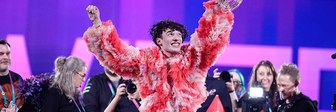The public tend to think that it’s acceptable for writers to write outside their identity and that they can do so realistically – but ethnic minority and LGB Britons aren’t so sure
Actor Riz Ahmed has called for an urgent change in ‘toxic portrayals’ of Muslims on TV over racist stereotyping. He’s not the first to criticise how minority characters are portrayed or a lack of diversity in writing rooms.
There is a broader ongoing debate on to what extent writers – who in the TV industry especially are often white, male and heterosexual – can, or should, portray identities that they have no lived experience of.
The public are generally overwhelmingly convinced that it’s acceptable for a writer to create a character who doesn’t share aspects of their identity such as gender identity, sexual orientation or ethnicity.
Seven in ten Britons (70%) say it’s acceptable for a white writer to create a character from an ethnic minority, while only 13% think it’s not. Britons from ethnic minority backgrounds also tend to agree, with three in five (62%) saying it is, while one in four (25%) say it’s unacceptable.
An overwhelming majority of lesbian, gay and bisexual Britons (82%) also say it’s acceptable for a straight writer to create a character with a different sexuality, while only 13% found it unacceptable.
Acceptance was high regardless of what aspect of identity we asked about. But among all Britons, opposition is highest to men writing women (16%) and women writing men (15%). Opposition among people from ethnic minorities to writers creating characters with specific identities is broadly similar for each characteristic we asked about, ranging from 22-26%.
LGB Britons are most opposed to a writer identifying with their biological sex creating a transgender character, with one in six (16%) saying it would not be acceptable.
But how realistically can writers portray characters that are very different to them?
Just because something isn’t wrong, doesn’t mean many people get it right. While the general population mostly think writers can accurately create a character from any background we asked about, those from ethnic minorities and LGB Britons tend to be more sceptical.
Only two in five Brits from ethnic minorities (39%) say a white writer could accurately write a character of their ethnicity, while 45% say they could not. In contrast, half of all Britons (52%) say a white writer could write a convincing ethnic minority character, while only one in four (27%) disagree.
When it comes to an ethnic minority writer creating a white persona, people from ethnic minorities are more inclined to think it can be done accurately, at 50% vs 35%. A majority of the public agree (57%), while a fifth (21%) don’t think it’s possible.
The Twitter page @MenWriteWomen has gained tens of thousands of followers by posting excerpts from male authors’ descriptions of female characters. But most Britons (55%) believe men can write women truthfully, while one in four (25%) say they can’t. The genders are largely in agreement, with 57% of men and 53% of women saying it can be done realistically.
Britons who are lesbian, gay or bisexual are split on whether a straight writer could realistically portray someone with a different sexuality, with half (52%) believing they could while two in five (42%) disagree.
Among the wider public, people are least convinced that a person who identifies with their sex from birth could write an authentic transgender role, although 45% believe they could, while 29% do not. LGB Britons are more sceptical, with 42% believing it’s possible, while 48% disagree.
See the full results for all Britons, Britons from ethnic minority backgrounds and Britons who identify as lesbian, gay or bisexual







